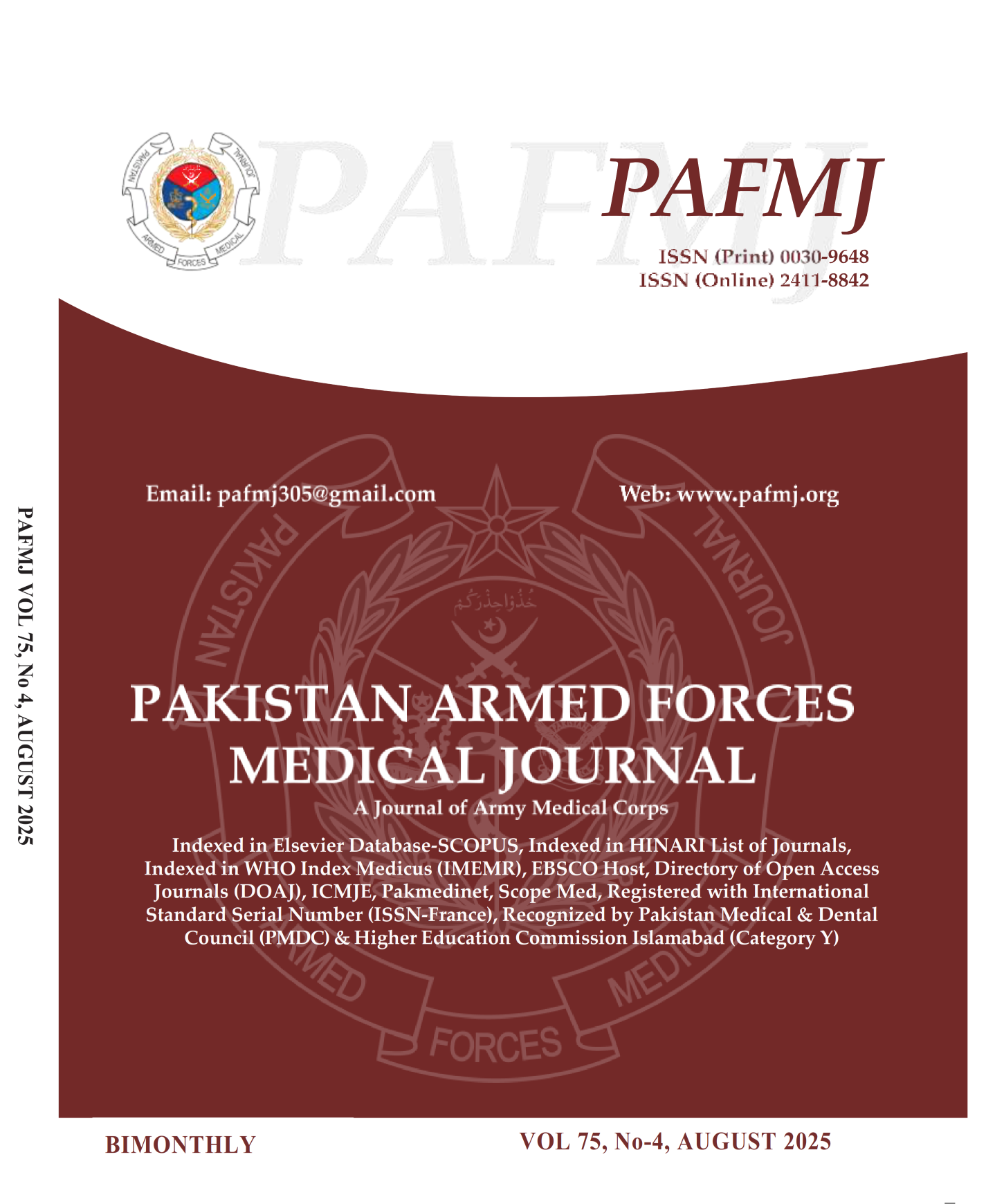Cognitive Deficits in Adult Schizophrenia and its Association with Clinical Factors
DOI:
https://doi.org/10.51253/pafmj.v75i4.11621Keywords:
Cognitive Impairment, Montreal Cognitive Assessment Test (MoCA), SchizophreniaAbstract
Objective: To assess cognitive deficits, their severity and associated clinical factors in adult patients of Schizophrenia, and to compare them with controls in psychiatric setups of Gilgit and Rawalpindi.
Study Design: Comparative cross-sectional study.
Place and Duration of Study: Psychiatry Department, Combined Military Hospital, Gilgit and Armed Forces Institute of Mental Health (AFIMH), Rawalpindi Pakistan, from Sep 2023 to Jan 2024.
Methodology: A total of 247 individuals (147 adult Schizophrenia patients and 100 controls) were included. The Montreal Cognitive Assessment test (MoCA) Urdu 7.1 version was used to assess the cognitive deficits in both patient (cases) and control groups. Various clinical factors were also assessed for association with cognitive deficits among cases.
Results: Among the total 247 study participants, the mean age was 31.97±7.63 years. One hundred and seventy-eight (27.9%) individuals were male and 69(27.9%) were females. Average MoCA score of the control group was 27.56±3.30 and average MoCA score for the cases was 20.63±3.89, with highly statistically significant difference (p-value <0.001) between cases and controls. There was signification association of cognitive deficits with earlier age of onset of illness, smoking, current use of depot antipsychotic injections, treatment with combined and atypical antipsychotics and higher anticholinergic burden score, greater number of previous psychiatric admissions, job status (unemployment) and a family history of psychiatric Illness.
Conclusion: Cognitive impairment is more frequently seen in Schizophrenia patients as compared to controls, with several cognitive domains significantly impacted including attention, concentration, executive functions and visuo-spatial abilities.
Downloads
References
1. WHO Schizophrenia. [Internet]. Accessed on 24th November 2024. Available from: http://www.who.int/news-room/fact-sheets/detail/schizophrenia
2. Ansari I. Mental Health Pakistan: Optimizing Brains. Int J Emerg Ment Health 2015; 17: 288.
3. Harvey PD, Bosia M, Cavallaro R, Howes OD, Kahn RS, Leucht S, et al. Cognitive dysfunction in schizophrenia: An expert group paper on the current state of the art. Schizophr Res Cogn 2022; 29: 100249. https://doi.org/10.1016/j.scog.2022.100249
4. Parlar ME, Heinrichs RW. Cognitive decline and impairment in schizophrenia spectrum disorders reconsidered. Schizophr Res 2021; 228: 626-632.
https://doi.org/10.1016/j.schres.2020.11.020
5. Gebreegziabhere Y, Habatmu K, Mihretu A. Cognitive impairment in people with schizophrenia: an umbrella review. Eur Arch Psychiatry Clin Neurosci 2022; 272(1): 1139–1155.
https://doi.org/10.1007/s00406-022-01416-6
6. Uppinkudru C, Gopalakrishnan R, Noel J, Kuruvilla A. Prevalence, correlates and explanatory models of cognitive deficits in patients with schizophrenia-A cross sectional study. Indian J Psychiatry 2023; 65(10): 1025-1034.
https://doi.org/10.4103/indianjpsychiatry.indianjpsychiatry_102_23
7. McCleery A, Nuechterlein KH. Cognitive impairment in psychotic illness: prevalence, profile of impairment, developmental course, and treatment considerations. Dialogues Clin Neurosci 2019; 21(3): 239-248.
https://doi.org/10.31887/DCNS.2019.21.3/amccleery
8. Wei S, Wang D, Wei G, Wang J, Zhou H, Xu H, et al. Association of cigarette smoking with cognitive impairment in male patients with chronic schizophrenia. Psycho-pharmacology 2020; 237(11): 3409-3416.
https://doi.org/10.1007/s00213-020-05621-w
9. Goonathilake P, Ediriweera D, Ruban R. Prevalence and correlates of cognitive impairment in schizophrenia: a cross-sectional study from a teaching hospital southern Sri Lanka. BMC Psychiatry 2022; 22(1): 716.
https://doi.org/10.1186/s12888-022-04368-2
10. SE Doğu, A Kokurcan. Screening for cognitive impairment in schizo-phrenia: A comparison between the Mini-Mental State Examination and the Montreal Cognitive Assessment Test. Turkish J Clin Psych 2023; 26(1): 28-36.
https://doi.org/10.5505/kpd.2023.67760
11. Zaheer A, Ghazal R, Pasha M. Cognitive Screening of Pakistani Substance-Dependent Male Patients Using Montreal Cognitive Assessment Score (MoCA). J Add Sci 2020; 6(1): 37-42.
https://doi.org/10.17756/jas.2020-048
12. Fox C, Richardson K, Maidment I, Savva G, Matthews F, Smithard D, et al. Anticholinergic Medication Use and Cognitive Impairment in the Older Population; The Medical Research Council Cognitive Function and Ageing Study. J Am Geriatr Soc 2011; 59(2): 1477-148.
https://doi.org/10.1111/j.1532-5415.2011.03491.x
13. Arunpongpaisal S, Sangsirilak A. Using MoCA-Thai to evaluate cognitive impairment in patients with schizophrenia. J Med Assoc Thai 2013; 96(7): 860-865.
https://doi.org/10.1016/j.encep.2007.12.005
14. Panov G, Dyulgerova S, Panova P. Cognition in Patients with Schizophrenia: Interplay between Working Memory, Disorganized Symptoms, Dissociation, and the Onset and Duration of Psychosis, as Well as Resistance to Treatment. Biomedicines 2023; 11(12): 3114.
https://doi.org/10.3390/biomedicines11123114
15. McCutcheon RA, Keefe RSE, McGuire PK. Cognitive impairment in schizophrenia: aetiology, pathophysiology, and treatment. Mol Psychiatry 2023; 28(1): 1902–1918.
https://doi.org/10.1038/s41380-023-01949-9
16. Burton CZ, Vella L, Harvey PD, Patterson TL, Heaton RK, Twamley EW. Factor structure of the MATRICS Consensus Cognitive Battery (MCCB) in schizophrenia. Schizophr Res 2013; 146: 244–248. https://doi.org/10.1016/j.schres.2013.02.026
17. Daniel C. Javitt. Cognitive Impairment Associated with Schizophrenia: From Pathophysiology to Treatment. Annu Rev Pharmacol Toxicol 2023; 63: 119–141.
https://doi.org/10.1146/annurev-pharmtox-051921-093250
18. Nicolas C, Catherine M, Marine B, Amélie P, Bruno R, Amine B. Chronic smoking and cognition in patients with schizophrenia: A meta-analysis, Schizophr Res 2020; 222: 113-121. https://doi.org/10.1016/j.schres.2020.03.071
19. Vita A, Gaebel W, Mucci A, Sachs G, Barlati S, Giordano GM, et al. European Psychiatric Association guidance on treatment of cognitive impairment in schizophrenia. Eur Psychiatr 2022; 65(1): e57. https://doi.org/10.1192/j.eurpsy.2022.2315
20. Kalinowska S, Trześniowska-Drukała B, Kłoda K, Safranow K, Misiak B, Cyran A. The Association between Lifestyle Choices and Schizophrenia Symptoms. J Clin Med 2021; 10(1): 165.
https://doi.org/10.3390/jcm10010165
21. Sciortino A, Domenico P, Alessandro D, Giuseppe M. Role of rTMS in the treatment of cognitive impairments in Bipolar Disorder and Schizophrenia: a review of Randomized Controlled Trials. J Affect Dis 2021; 280(2): 148-155.
https://doi/org/10.1016/j.jad.2020.11.001
Downloads
Published
Issue
Section
License
Copyright (c) 2025 Ayesha Shabbir, Sohail Ali, Assam Muhammad Bin Sharif, Saman Ijaz, Maria Ahmed Khan, Malik Nohman

This work is licensed under a Creative Commons Attribution-NonCommercial 4.0 International License.















